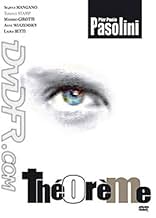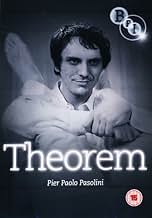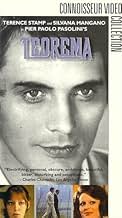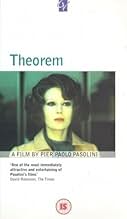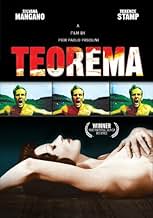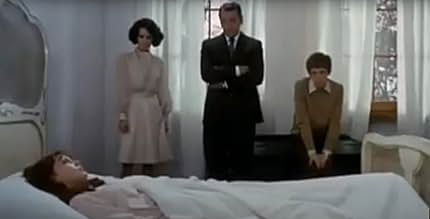Un misterioso giovane seduce ogni membro di una famiglia borghese. Quando all'improvviso se ne va, come cambieranno le loro vite?Un misterioso giovane seduce ogni membro di una famiglia borghese. Quando all'improvviso se ne va, come cambieranno le loro vite?Un misterioso giovane seduce ogni membro di una famiglia borghese. Quando all'improvviso se ne va, come cambieranno le loro vite?
- Regia
- Sceneggiatura
- Star
- Premi
- 1 vittoria e 5 candidature totali
- Second Boy
- (as Ivan Scratuglia)
- Interviewer
- (non citato nei titoli originali)
- Old Peasant
- (non citato nei titoli originali)
Recensioni in evidenza
"A theorem is a proposition that has been or is to be proved on the basis of explicit assumptions...
Pier Paolo Pasolini's "Teorema" (1968) is a fable that tells how a handsome young man (extremely attractive Terrence Stamp "with the eyes of an angel and the grin of the devil") stays as a guest in the house of a wealthy factory owner and seduces one after another all members of the household - the maid, the teenagers son and daughter, the wife, and the father (in this order). When released in 1968, the film had divided believers and atheists as much as critics. Some of Pasolini's comrades-Marxists were also infuriated by this attack on their ideology. Many viewers were disturbed by its removing sexual taboos even though sex is handled very tastefully. It is more a symbol of connection and closeness to God (or it could be to Devil, we may only guess). Made almost forty years ago, "Teorema" seems to be simple and puzzling at the same time. It reminded me Ingmar Bergman's movies from his "Trilogy of Faith" which sums up Bergman's own philosophy regarding religion and God "God has never spoken because He does not exist". In Bergman's world where God does not exist, communication and understanding are not possible and everyone is locked in their loneliness like in a cage. In Pasolini's film, God sends his angel to a chosen family. He has spoken to them and known them but then he left them. Did they become happier? Is that possible for a human to keep on living like nothing happen after the encounter with God?
I watched "Teorema" for the first time few weeks ago but I still think about it trying to understand what "theorem" Pasolini tried to prove? I also was thinking about the films that were inspired by or reminded me a lot about "Teorema". I've mentioned Bergman already. Luis Bunuel with "Nazarin", "Viridiana"," Belle de jour" (1967) - the mother's transformation in "Teorema" reminds about the film immediately, and "Le Charme discret de la bourgeoisie"(1972) come to mind. I was also reminded of Andrei Tarkovsky. The visual style, camera work and the use of music in "Teorema" seem similar with Russian Master's. His last film, "Sacrifice" may be the one closest to Pasolini's film.
I would never say that everyone must watch "Teorema". It is a very unusual film that could be easily dismissed as ridiculous and dated or it would be thought of as absolutely brilliant and mysterious. I have not decided yet but I can't forget it.
P.S. November 29, 2006 - It's been several months since I saw "Teorema" and now I believe that it is brilliant and belongs to the the best films ever made. One can meditate forever on its depths and mystery, and that's the sign of a great work of Art for me.
Yes, there is a fable here, a mysterious man upsets balances in a bourgeois household. Yes, it is from those times -Bunueltimes, Godardtimes- when the word 'bourgeois' was meant quite vehemently. It is symbolically abstruse throughout about empty lives and the quest for meaning.
But, I think as with these people depicted on desperate journeys to fulfillment, the more you cling to the search for meaning as a viewer and try to boil it down to something that makes sense, the more you end up with just an allegory about the failure to do it. For all I know, that was Pasolini's intention, echoed loudly in the parting cry for god in the wilderness.
No matter. Me and him mean wholly different things by emptiness. What captivates me here is the free form of the narrative, the cinematic eye that places you as transparent observer in the same world as these people, not easy to accomplish this at all, and the journey through cracks of story to the wondrous emptiness of everything (trees, sunlight, concrete, people) languidly floating in space together.
It is in the same direction as Antonioni, though hampered by allegory. It invigorates the senses like he does. And the eye is tuned to the same architecture of empty space as seen in L'Eclisse and Blowup.
Pasolini may have meant this as lament or indictment. I get the same melancholy joy as from Japanese woodblocks.
Lo sapevi?
- QuizAt the 1968 Venice Film Festival, the film was given an award by the International Catholic Film Office. The award was withdrawn after critical remarks by Pope Paul VI. After the festival the film was confiscated by Italian police and Pier Paolo Pasolini charged with obscenity, but acquitted.
- BlooperAfter literally rolling around in a ditch with some kid she picked up on the street, the mother's designer suit remains clean and pressed.
- Citazioni
Lucia, the mother: I realize now that I've never had any real interest in anything. I don't mean anything grand. Just the simple, everyday interest my husband takes in his work, or my son in his studies, or Odetta in family life. I've had nothing like that. I don't know how I lived with such emptiness, yet I did. If there was anything at all, some instinctive love of life, it has withering away - like a garden where no one ever goes. Actually, that void was filled with false and wretched values, an appalling jumble of misguided ideas. Now I see: You filled my life with a real and total interest. So by leaving, you're not destroying anything that was there before, except my chaste bourgeois reputation. Who cares about that?
- ConnessioniEdited into Histoire(s) du cinéma: Seul le cinéma (1994)
- Colonne sonoreRequiem
KV 626
Written by Wolfgang Amadeus Mozart
Performed by Russian Academy Choir and Moscow Philharmonic Orchestra
Courtesy of MK Records
I più visti
- How long is Teorema?Powered by Alexa
Dettagli
- Data di uscita
- Paese di origine
- Lingue
- Celebre anche come
- Theorem
- Luoghi delle riprese
- 16 Via Palatino, Milan, Lombardia, Italia(family house)
- Aziende produttrici
- Vedi altri crediti dell’azienda su IMDbPro
- Tempo di esecuzione1 ora 38 minuti
- Colore
- Proporzioni
- 1.85 : 1
Contribuisci a questa pagina




